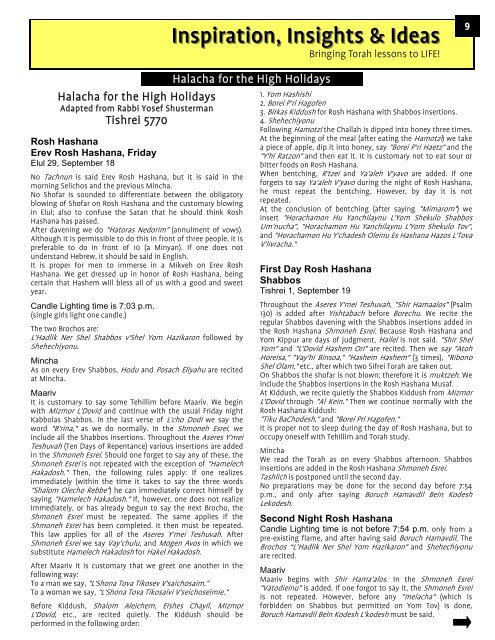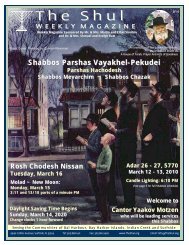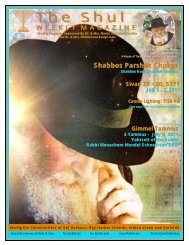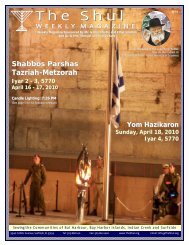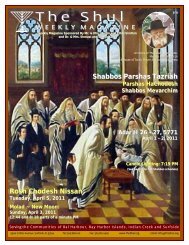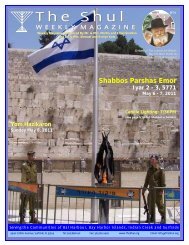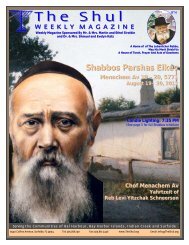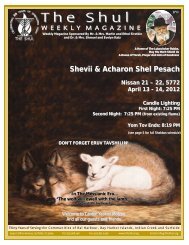You also want an ePaper? Increase the reach of your titles
YUMPU automatically turns print PDFs into web optimized ePapers that Google loves.
Halacha for the High Holidays<br />
Adapted from Rabbi Yosef Shusterman<br />
Tishrei 5770<br />
Rosh Hashana<br />
Erev Rosh Hashana, Friday<br />
Elul 29, September 18<br />
No Tachnun is said Erev Rosh Hashana, but it is said in the<br />
morning Selichos and the previous Mincha.<br />
No Shofar is sounded to differentiate between the obligatory<br />
blowing of Shofar on Rosh Hashana and the customary blowing<br />
in Elul; also to confuse the Satan that he should think Rosh<br />
Hashana has passed.<br />
After davening we do "Hatoras Nedorim" (annulment of vows).<br />
Although it is permissible to do this in front of three people, it is<br />
preferable to do in front of 10 (a Minyan). If one does not<br />
understand Hebrew, it should be said in English.<br />
It is proper for men to immerse in a Mikveh on Erev Rosh<br />
Hashana. We get dressed up in honor of Rosh Hashana, being<br />
certain that Hashem will bless all of us with a good and sweet<br />
year.<br />
Candle Lighting time is 7:03 p.m.<br />
(single girls light one candle.)<br />
<strong>The</strong> two Brochos are:<br />
L'Hadlik Ner Shel Shabbos v'Shel Yom Hazikaron followed by<br />
Shehechiyonu.<br />
Mincha<br />
As on every Erev Shabbos, Hodu and Posach Eliyahu are recited<br />
at Mincha.<br />
Maariv<br />
It is customary to say some Tehillim before Maariv. We begin<br />
with Mizmor L'Dovid and continue with the usual Friday night<br />
Kabbolas Shabbos. In the last verse of L'cho Dodi we say the<br />
word "B'rina," as we do normally. In the Shmoneh Esrei, we<br />
include all the Shabbos insertions. Throughout the Aseres Y'mei<br />
Teshuvah (Ten Days of Repentance) various insertions are added<br />
in the Shmoneh Esrei. Should one forget to say any of these, the<br />
Shmoneh Esrei is not repeated with the exception of "Hamelech<br />
Hakadosh." <strong>The</strong>n, the following rules apply: If one realizes<br />
immediately (within the time it takes to say the three words<br />
"Shalom Olecho Rebbe") he can immediately correct himself by<br />
saying "Hamelech Hakadosh." If, however, one does not realize<br />
immediately, or has already begun to say the next Brocho, the<br />
Shmoneh Esrei must be repeated. <strong>The</strong> same applies if the<br />
Shmoneh Esrei has been completed. It then must be repeated.<br />
This law applies for all of the Aseres Y'mei Teshuvah. After<br />
Shmoneh Esrei we say Vay'chulu, and Mogen Avos in which we<br />
substitute Hamelech Hakadosh for Hakel Hakadosh.<br />
After Maariv it is customary that we greet one another in the<br />
following way:<br />
To a man we say, "L'Shona Tova Tikosev V'saichosaim."<br />
To a woman we say, "L'Shona Tova Tikosaivi V'seichoseimie."<br />
Before Kiddush, Shalom Aleichem, Eishes Chayil, Mizmor<br />
L'Dovid, etc., are recited quietly. <strong>The</strong> Kiddush should be<br />
performed in the following order:<br />
Inspiration, Insights & Ideas<br />
Bringing Torah lessons to LIFE!<br />
Halacha for the High Holidays<br />
1. Yom Hashishi<br />
2. Borei P'ri Hagofen<br />
3. Birkas Kiddush for Rosh Hashana with Shabbos insertions.<br />
4. Shehechiyonu<br />
Following Hamotzi the Challah is dipped into honey three times.<br />
At the beginning of the meal (after eating the Hamotzi) we take<br />
a piece of apple, dip it into honey, say "Borei P'ri Haetz" and the<br />
"Y'hi Ratzon" and then eat it. It is customary not to eat sour or<br />
bitter foods on Rosh Hashana.<br />
When bentching, R'tzei and Ya'aleh V'yavo are added. If one<br />
forgets to say Ya'aleh V'yavo during the night of Rosh Hashana,<br />
he must repeat the bentching. However, by day it is not<br />
repeated.<br />
At the conclusion of bentching (after saying "Mimarom") we<br />
insert "Horachamon Hu Yanchilaynu L'Yom Shekulo Shabbos<br />
Um'nucha", "Horachamon Hu Yanchilaynu L'Yom Shekulo Tov",<br />
and "Horachamon Hu Y'chadesh Oleinu Es Hashana Hazos L'Tova<br />
V'livracha."<br />
First Day Rosh Hashana<br />
Shabbos<br />
Tishrei 1, September 19<br />
Throughout the Aseres Y'mei Teshuvah, "Shir Hamaalos" (Psalm<br />
130) is added after Yishtabach before Borechu. We recite the<br />
regular Shabbos davening with the Shabbos insertions added in<br />
the Rosh Hashana Shmoneh Esrei. Because Rosh Hashana and<br />
Yom Kippur are days of judgment, Hallel is not said. "Shir Shel<br />
Yom" and "L'Dovid Hashem Ori" are recited. <strong>The</strong>n we say "Atoh<br />
Horeisa," "Vay'hi Binsoa," "Hashem Hashem" (3 times), "Ribono<br />
Shel Olam," etc., after which two Sifrei Torah are taken out.<br />
On Shabbos the shofar is not blown; therefore it is muktzeh. We<br />
include the Shabbos insertions in the Rosh Hashana Musaf.<br />
At Kiddush, we recite quietly the Shabbos Kiddush from Mizmor<br />
L'Dovid through "Al Kein." <strong>The</strong>n we continue normally with the<br />
Rosh Hashana Kiddush:<br />
"Tiku BaChodesh," and "Borei Pri Hagofen."<br />
It is proper not to sleep during the day of Rosh Hashana, but to<br />
occupy oneself with Tehillim and Torah study.<br />
Mincha<br />
We read the Torah as on every Shabbos afternoon. Shabbos<br />
insertions are added in the Rosh Hashana Shmoneh Esrei.<br />
Tashlich is postponed until the second day.<br />
No preparations may be done for the second day before 7:54<br />
p.m., and only after saying Boruch Hamavdil Bein Kodesh<br />
Lekodesh.<br />
Second Night Rosh Hashana<br />
Candle Lighting time is not before 7:54 p.m. only from a<br />
pre-existing flame, and after having said Boruch Hamavdil. <strong>The</strong><br />
Brochos “L’Hadlik Ner Shel Yom Hazikaron" and Shehechiyonu<br />
are recited.<br />
Maariv<br />
Maariv begins with Shir Hama'alos. In the Shmoneh Esrei<br />
"Vatodieinu" is added. If one forgot to say it, the Shmoneh Esrei<br />
is not repeated. However, before any "melacha" (which is<br />
forbidden on Shabbos but permitted on Yom Tov) is done,<br />
Boruch Hamavdil Bein Kodesh L'kodesh must be said.<br />
9


